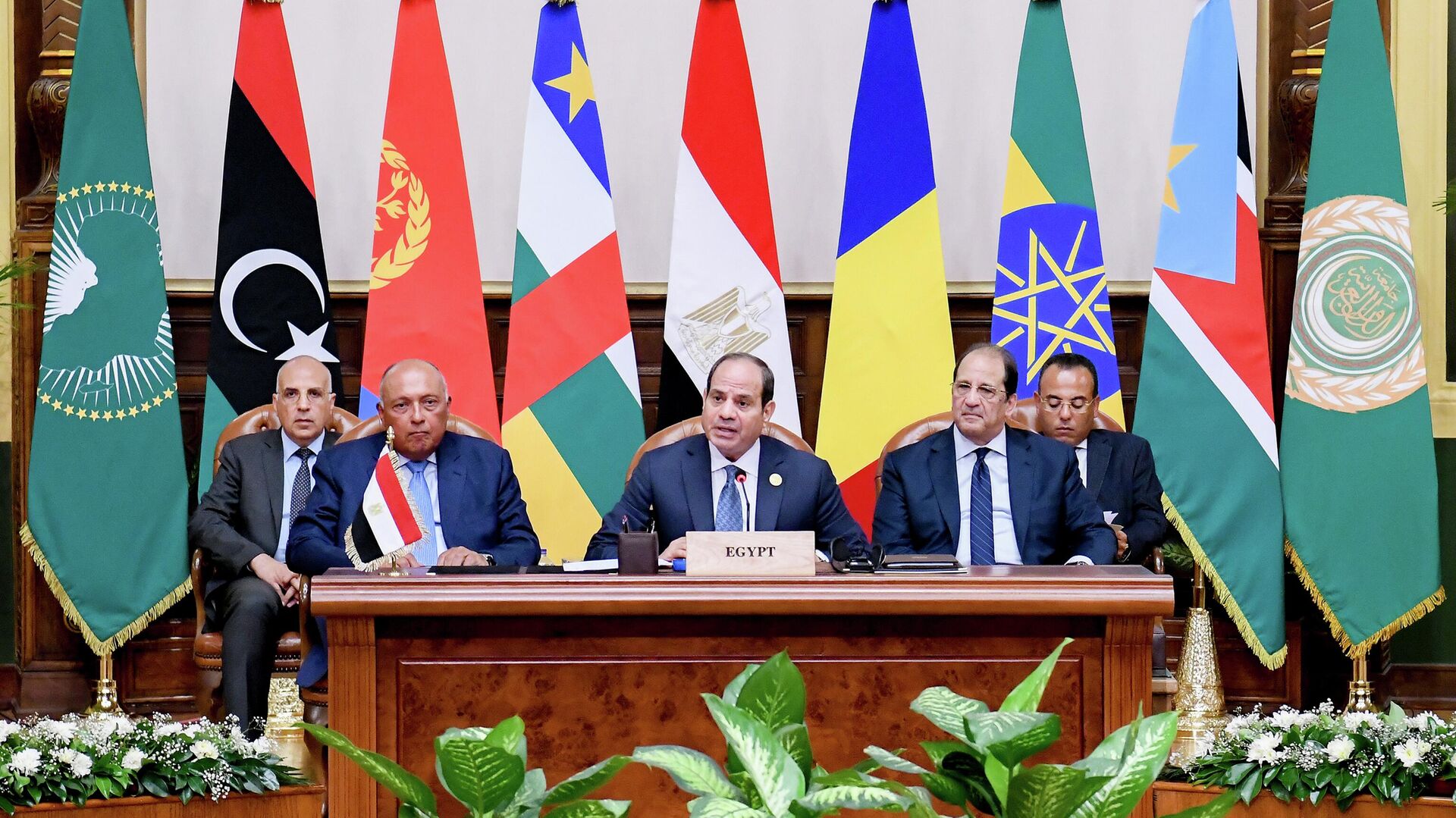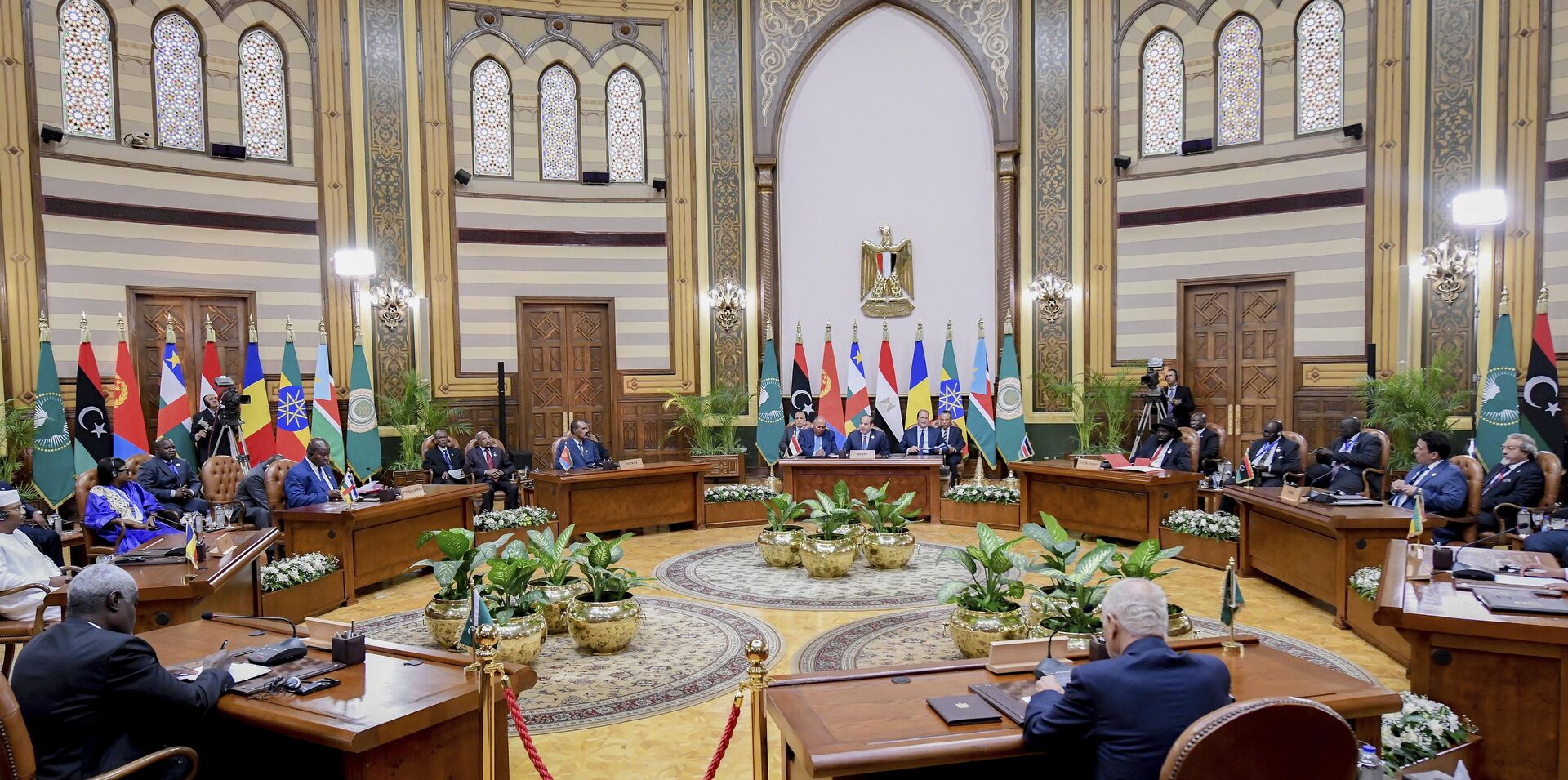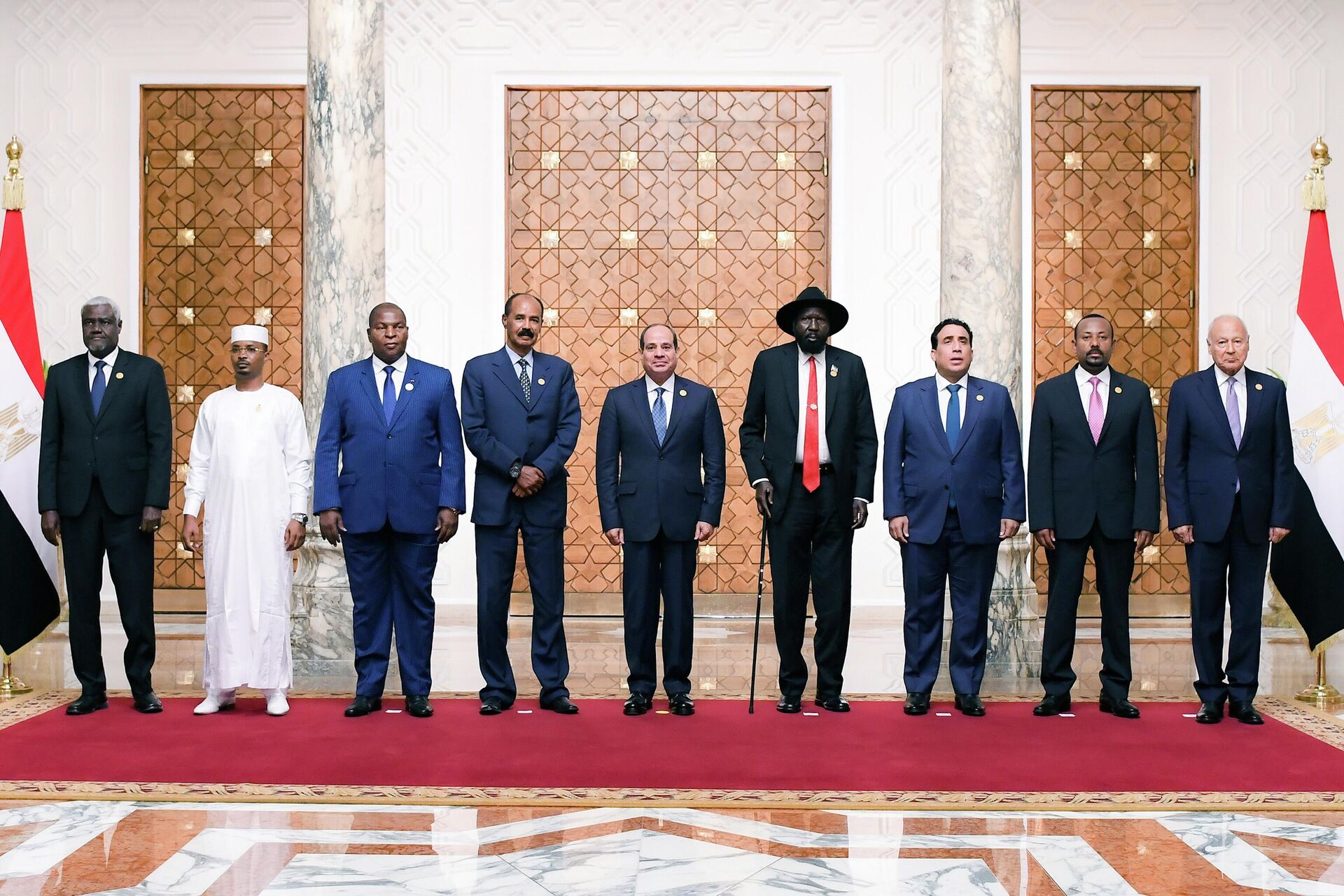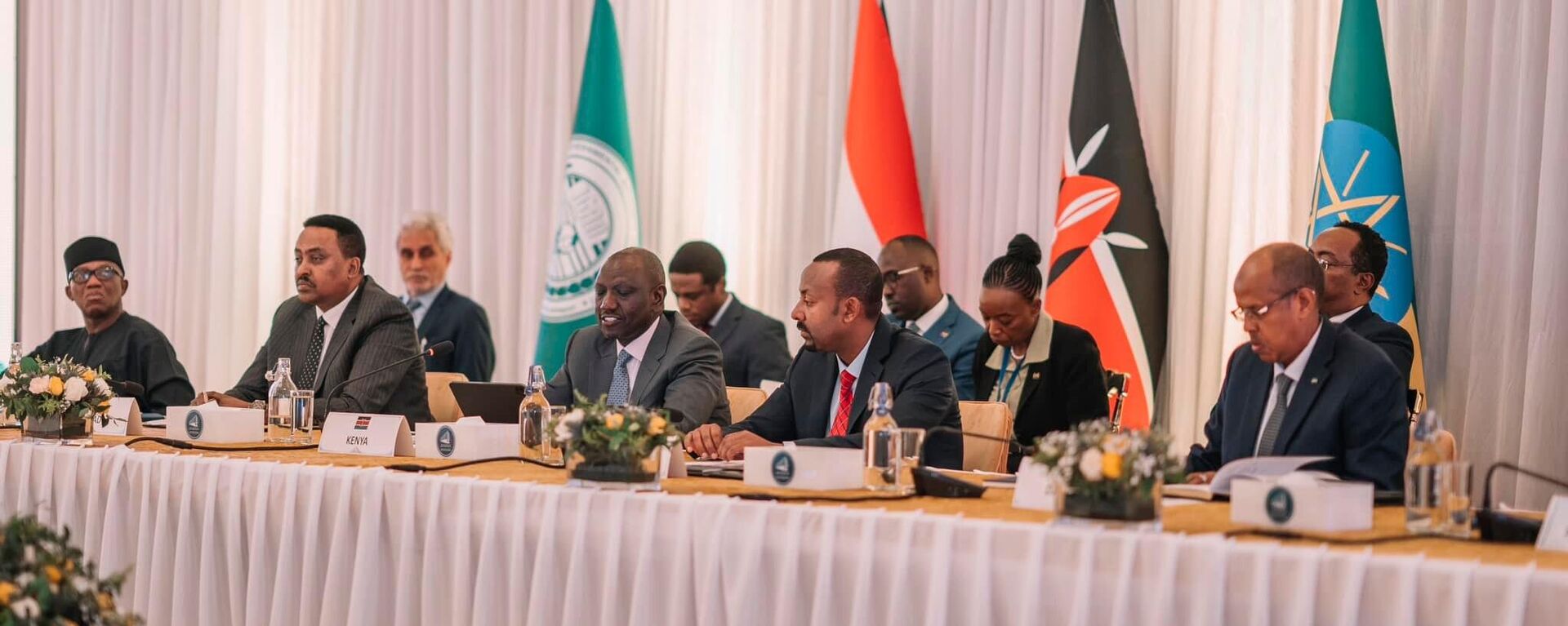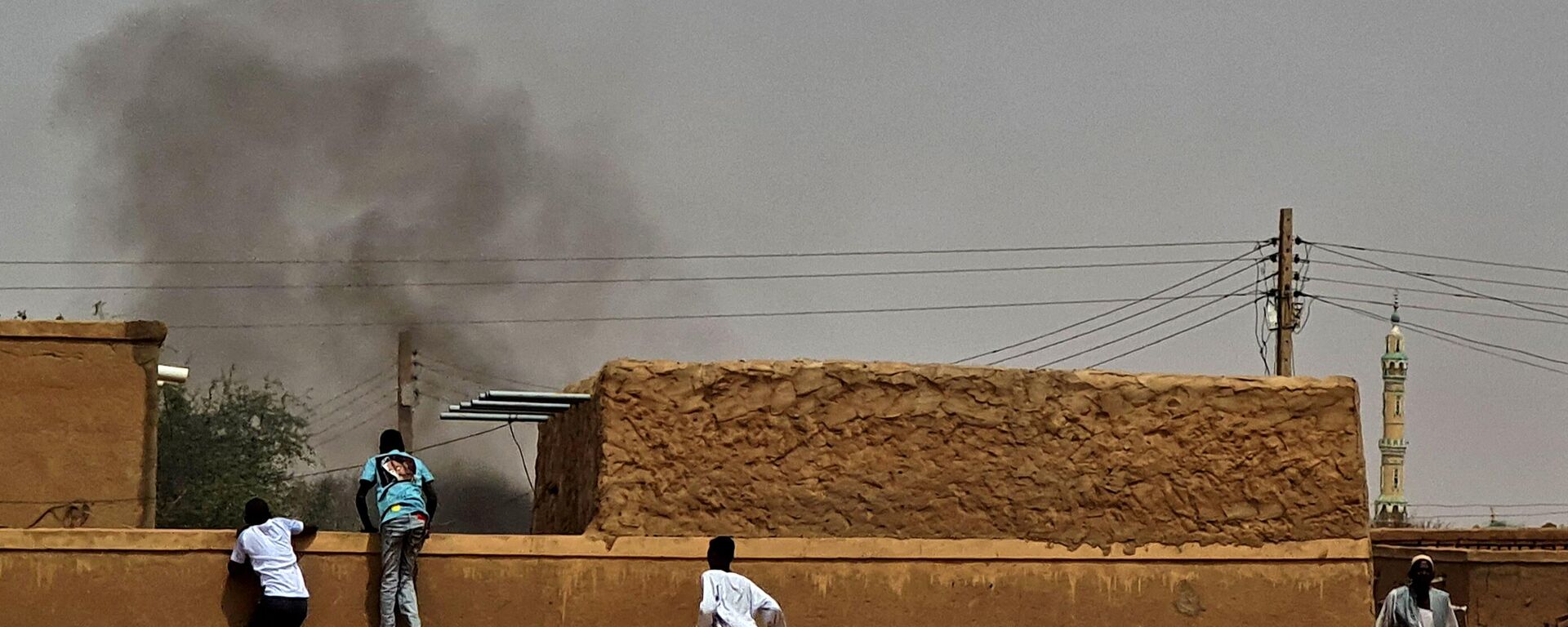https://en.sputniknews.africa/20230713/african-leaders-raise-alarm-at-cairo-summit-of-sudans-neighbors-1060510489.html
African Leaders Raise Alarm at Cairo Summit of Sudan's Neighbors?
African Leaders Raise Alarm at Cairo Summit of Sudan's Neighbors?
Sputnik Africa
A high-level preparatory meeting for the summit of Sudan's neighboring countries was held in Cairo on Wednesday, with the Sudanese Foreign Ministry welcoming... 13.07.2023, Sputnik Africa
2023-07-13T17:37+0200
2023-07-13T17:37+0200
2023-07-13T17:37+0200
armed clashes in sudan
north africa
sudan
crisis
egypt
ethiopia
peace
ceasefire
conflict
summit
https://cdn1.img.sputniknews.africa/img/07e7/07/0d/1060511685_0:321:3071:2048_1920x0_80_0_0_00c5909f2e42d405ed3708f9a1f51d1e.jpg
A summit of leaders of Sudan's neighboring countries kicked off on Thursday in the Egyptian capital, Cairo, to develop effective mechanisms to peacefully resolve the crisis in the North African country.The Cairo summit, attended by the leaders of Sudan's seven neighbors (Egypt, Libya, Chad, Central African Republic, South Sudan, Eritrea, and Ethiopia), is the latest regional and international effort to establish a cease-fire and prevent the outbreak of civil war in Sudan.Moussa Faki Mahamat, chairperson of the African Union Commission, and Ahmed Aboul Gheit, secretary-general of the Arab League, also attended the conference.Egyptian President Abdel Fattah el-Sisi opened the summit sessions by presenting a vision to end the ongoing conflict in Sudan between the country's regular army and the Rapid Support Forces (RSF).Egyptian Vision for Resolving Sudan's CrisisPresident el-Sisi also called for the start of serious negotiations for a ceasefire in Sudan and the establishment of a mechanism to communicate with the two sides of the conflict to find a solution to the ongoing crisis.He also called for an inclusive dialogue that includes all parties of the Sudanese people to be launched, and the formation of a communication mechanism to communicate with the Sudanese parties to find a solution to the crisis.The Egyptian vision for resolving the Sudanese crisis also included developing a "communication mechanism, emanating from this conference, to create an executive action plan to reach a comprehensive solution."Uniting All Visions of Sudan's NeighborsThe Egyptian leader also called to unite the visions of Sudan's neighboring countries on the crisis that the country is witnessing, adding that Egypt's southern neighbor "is passing through a profound crisis that has its negative repercussions on the security and stability of the region, the world and, in particular, Sudan’s neighboring countries."For his part, Ethiopian Prime Minister Abiy Ahmed called for a permanent ceasefire in Sudan and urged the continuation of dialogue to achieve peace, saying that the impact of the ongoing conflict in Sudan affects all neighboring countries.At a time when Ahmed agreed with el-Sisi on the need to develop effective mechanisms for the participation of neighboring countries in resolving the Sudanese crisis through peaceful means, he called for the coordination of regional and international efforts aimed at achieving the same goal.The head of the Libyan Presidential Council, Mohamed al-Menfi, also called for an immediate ceasefire and the unification of efforts to settle the Sudanese conflict.Chad's interim president, Mahamat Deby Itno, said the confrontations in Sudan were a "source of serious concern" for Chad and all neighboring countries, and that his country "has not stopped suffering from the deterioration of the situation because of the confrontations targeting civilians."Deby appealed to the need to develop appropriate joint solutions to remedy this emergency situation, as well as address the shortage of food, medicine and lack of medical equipment.Respecting Sudan's Independence and SovereigntyThe president of the Republic of South Sudan, Salva Kiir Mayardit, stressed that ending the conflict in Sudan is a priority for neighboring countries, adding that "this summit comes at a critical time."The South Sudanese leader stressed the need to involve the Sudanese people in efforts to resolve the ongoing conflict in their country, and called on the international community to find ways to address what he described as a "catastrophic" crisis in Sudan.For his part, Eritrean President Isaias Afwerki, in his speech, called for respecting Sudan's independence and sovereignty and the need to prevent external interference in Sudanese internal affairs, asserting that the Sudanese people will have the final say in resolving the crisis.The President of the Central African Republic Faustin-Archange Touadera,warned of the growing "smuggling of small arms" across his country's "porous border" with Sudan.Sudan is witnessing an ongoing armed conflict between the Sudanese Armed Forces, led by the Chairman of the Sudanese Sovereign Council Lieutenant General Abdel Fattah al-Burhan, and the paramilitary Rapid Support Forces (RSF), led by his former deputy, Mohamed Hamdan Dagalo.With its epicenter in the country's capital city of Khartoum, the conflict has claimed the lives of nearly 3,000 people and displaced more than 2.2 million in the country, with another 645,000 fleeing across borders.
https://en.sputniknews.africa/20230711/east-africas-igad-to-consider-deployment-of-force-to-protect-civilians-in-sudan-1060460855.html
https://en.sputniknews.africa/20230713/leaders-of-ethiopia-and-egypt-discuss-crisis-in-sudan-disputed-blue-nile-dam-1060501009.html
north africa
sudan
egypt
ethiopia
cairo
Sputnik Africa
feedback@sputniknews.com
+74956456601
MIA „Rossiya Segodnya“
2023
Muhammad Nooh Osman
https://cdn1.img.sputniknews.africa/img/07e7/04/0a/1058467512_0:0:1280:1280_100x100_80_0_0_ec723833bcbfcaed2e21952965ad99e4.jpg
Muhammad Nooh Osman
https://cdn1.img.sputniknews.africa/img/07e7/04/0a/1058467512_0:0:1280:1280_100x100_80_0_0_ec723833bcbfcaed2e21952965ad99e4.jpg
News
en_EN
Sputnik Africa
feedback@sputniknews.com
+74956456601
MIA „Rossiya Segodnya“
Sputnik Africa
feedback@sputniknews.com
+74956456601
MIA „Rossiya Segodnya“
Muhammad Nooh Osman
https://cdn1.img.sputniknews.africa/img/07e7/04/0a/1058467512_0:0:1280:1280_100x100_80_0_0_ec723833bcbfcaed2e21952965ad99e4.jpg
north africa, sudan, crisis, egypt, ethiopia, peace, ceasefire, conflict, summit, cairo, africa in details
north africa, sudan, crisis, egypt, ethiopia, peace, ceasefire, conflict, summit, cairo, africa in details
African Leaders Raise Alarm at Cairo Summit of Sudan's Neighbors?
Muhammad Nooh Osman
Writer/Editor
Longread
A high-level preparatory meeting for the summit of Sudan's neighboring countries was held in Cairo on Wednesday, with the Sudanese Foreign Ministry welcoming Egypt's hosting of the conference. The summit aims to find a lasting solution to the ongoing armed conflict between the Sudanese Army and the paramilitary Rapid Support Forces (RSF).
A summit of leaders of Sudan's neighboring countries kicked off on Thursday in the Egyptian capital, Cairo, to develop effective mechanisms to peacefully resolve the
crisis in the North African country.
The Cairo summit, attended by the leaders of Sudan's seven neighbors (Egypt, Libya, Chad, Central African Republic, South Sudan, Eritrea, and Ethiopia), is the latest regional and international effort to establish a cease-fire and prevent the outbreak of civil war in Sudan.
Moussa Faki Mahamat, chairperson of the African Union Commission, and Ahmed Aboul Gheit, secretary-general of the Arab League, also attended the conference.
Egyptian President Abdel Fattah el-Sisi opened the summit sessions by presenting a vision to end the ongoing conflict in Sudan between the country's
regular army and the Rapid Support Forces (RSF).
Egyptian Vision for Resolving Sudan's Crisis
President el-Sisi also called for the start of serious negotiations for a ceasefire in Sudan and the establishment of a
mechanism to communicate with the two sides of the conflict to find a solution to the ongoing crisis.
"Allow me to seize this opportunity to outline to you Egypt’s vision on how Sudan can emerge from the current crisis. This vision is based on the following elements: calling on the warring parties to stop the escalation and start, without delay, serious negotiations, aimed at reaching an immediate and lasting ceasefire; calling on all Sudanese parties to facilitate the access of humanitarian assistance," the Egyptian leader said.
He also called for an inclusive dialogue that includes all parties of the Sudanese people to be launched, and the formation of a communication mechanism to communicate with the Sudanese parties to find a solution to the crisis.
"... launching an inclusive dialogue of the Sudanese parties, with the participation of political and civil forces and representatives of women and the youth, with the aim of starting a comprehensive political process, fulfilling the ambition and aspirations of the Sudanese people for security, prosperity, stability and democracy," el-Sisi stated.
The Egyptian vision for resolving the Sudanese crisis also included developing a "communication mechanism, emanating from this conference, to create an executive action plan to reach a comprehensive solution."
"This mechanism shall be tasked with engaging directly with the parties to the conflict and coordinating with existing mechanisms and frameworks," the president noted.
Uniting All Visions of Sudan's Neighbors
The Egyptian leader also called to unite the visions of Sudan's neighboring countries on the crisis that the country is witnessing, adding that Egypt's southern neighbor "is passing through a profound crisis that has its negative repercussions on the security and stability of the region, the world and, in particular, Sudan’s neighboring countries."
For his part, Ethiopian Prime Minister Abiy Ahmed called for a permanent ceasefire in Sudan and urged the continuation of dialogue to achieve peace, saying that the impact of the ongoing conflict in Sudan affects all neighboring countries.
At a time when Ahmed agreed with el-Sisi on the need to develop effective mechanisms for the participation of neighboring countries in resolving the Sudanese crisis through peaceful means, he called for the coordination of regional and
international efforts aimed at achieving the same goal.
The head of the Libyan Presidential Council, Mohamed al-Menfi, also called for an immediate ceasefire and the unification of efforts to settle the Sudanese conflict.
Chad's interim president, Mahamat Deby Itno, said the confrontations in Sudan were a "source of serious concern" for Chad and all neighboring countries, and that his country "has not stopped suffering from the deterioration of the situation because of the confrontations targeting civilians."
Deby appealed to the need to develop appropriate joint solutions to remedy this
emergency situation, as well as address the shortage of food, medicine and lack of medical equipment.
Respecting Sudan's Independence and Sovereignty
The president of the Republic of South Sudan, Salva Kiir Mayardit, stressed that ending the conflict in Sudan is a priority for neighboring countries, adding that "this summit comes at a critical time."
The South Sudanese leader stressed the need to
involve the Sudanese people in efforts to resolve the ongoing conflict in their country, and called on the international community to find ways to address what he described as a "catastrophic" crisis in Sudan.
For his part, Eritrean President Isaias Afwerki, in his speech, called for respecting Sudan's independence and sovereignty and the need to prevent external interference in Sudanese internal affairs, asserting that the Sudanese people will have the final say in resolving the crisis.
The President of the Central African Republic Faustin-Archange Touadera,warned of the growing "smuggling of small arms" across his country's "porous border" with Sudan.
"There are severe shortages in food and fuel," Touadera said, highlighting a looming "humanitarian disaster" in the neighboring country.
Sudan is witnessing an ongoing armed conflict between the Sudanese Armed Forces, led by the Chairman of the Sudanese Sovereign Council Lieutenant General Abdel Fattah al-Burhan, and the paramilitary Rapid Support Forces (RSF), led by his former deputy, Mohamed Hamdan Dagalo.
With its epicenter in the country's capital city of Khartoum, the
conflict has claimed the lives of nearly 3,000 people and displaced more than 2.2 million in the country, with another 645,000 fleeing across borders.
